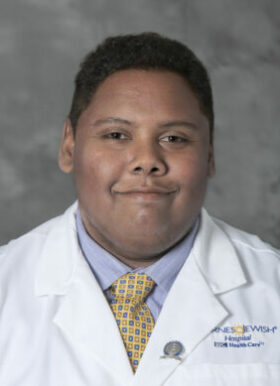
Stephen Persaud, MD, PhD
Assistant Professor, Pathology & Immunology
Contact
- Email: persaud@wustl.edu
Education
BS, Biological Sciences: Cornell University, Ithaca, NY (2005)
MD: Washington University, St. Louis, MO (2015)
PhD: Immunology, Washington University, St. Louis, MO (2015)
Residency: Clinical Pathology, Barnes-Jewish Hospital, St. Louis, MO (2018)
Clinical Pathology-Physician Scientist Training Program
Boards
Medical Licensure, Missouri Board for the Healing Arts, 2018-present
Diplomate, American Board of Pathology (Clinical Pathology), 2018-2028
Recognition
American Society of Hematology Fellow-to-Faculty Scholar Award (2023)
NCI Research Supplement to Promote Diversity in Health-Related Research (with John DiPersio) (2022)
Developmental Research Program Award, Washington University SPORE in Leukemia (2022)
Career Enhancement Program Award, Washington University SPORE in Leukemia (2020)
New Investigator Award, American Society for Transplantation and Cellular Therapy (2020)
Trainee Abstract Achievement Award, American Society of Hematology (2019)
Paul Calabresi K12 Career Development Award in Clinical Oncology (relinquished to accept SPORE CEP) (2019)
Outstanding Grand Rounds Presentation Award, Division of Laboratory and Genomic Medicine (2016)
American Association of Immunologists Travel Award (2013)
NIH/NHLBI K08 Career Development Award (2024)
Research Interests
Hematopoietic stem cell transplantation (HSCT) holds the potential for cure of a variety of malignant and non-malignant hematologic disorders. However, the severe acute and chronic toxicities imposed by the chemotherapy- and irradiation-based conditioning regimens used to prepare recipients for transplant may preclude them from accessing the lifesaving benefits of HSCT. My research seeks to address this urgent and unmet need by developing minimally toxic, immunotherapeutic conditioning strategies which enable the therapeutic benefits of HSCT with minimal injury to the recipient.
During my postdoctoral training in Dr. John DiPersio’s lab, I discovered a novel allogeneic HSCT conditioning strategy combining Janus kinase 1/2 inhibitors with CD45- or CD117-targeted antibody-drug conjugates (ADC), which enabled stable engraftment between fully MHC-mismatched mice with >99% myeloid lineage donor chimerism. Notably, compared to conditioning with irradiation, ADC-based conditioning in murine models did not promote graft-versus-host disease. Several projects stemming from this work seek to optimize antibody-based conditioning regimens to better achieve the therapeutic goals of transplant in specific disease settings. For example, we developed highly-potent, fully myeloablative ADCs designed for HSCT conditioning in the context of acute myeloid leukemia, for which induction of full donor chimerism and maximal antileukemia benefit enabled by the conditioning regimen affords protection from relapse. For non-malignant diseases like sickle cell disease, in which antileukemia benefit is not needed and mixed chimerism is sufficient for cure, we are developing toxic payload-free regimens able to achieve cure with as few toxicities as possible when used in conjunction with either allogeneic HSCT or autologous gene therapy.
Selected Publications
Preventing graft re-JAK-tion: safer transplant conditioning enables murine islet allograft tolerance and diabetes reversal
Publication
Conditioning with anti-CD47 and anti-CD117 plus JAK inhibition enables toxic payload-free allogeneic transplantation
Publication
Antibody-drug conjugates plus Janus kinase inhibitors enable MHC-mismatched allogeneic hematopoietic stem cell transplantation
Publication
CD4 Inhibits Helper T Cell Activation at Lower Affinity Threshold for Full-Length T Cell Receptors Than Single Chain Signaling Constructs
Publication